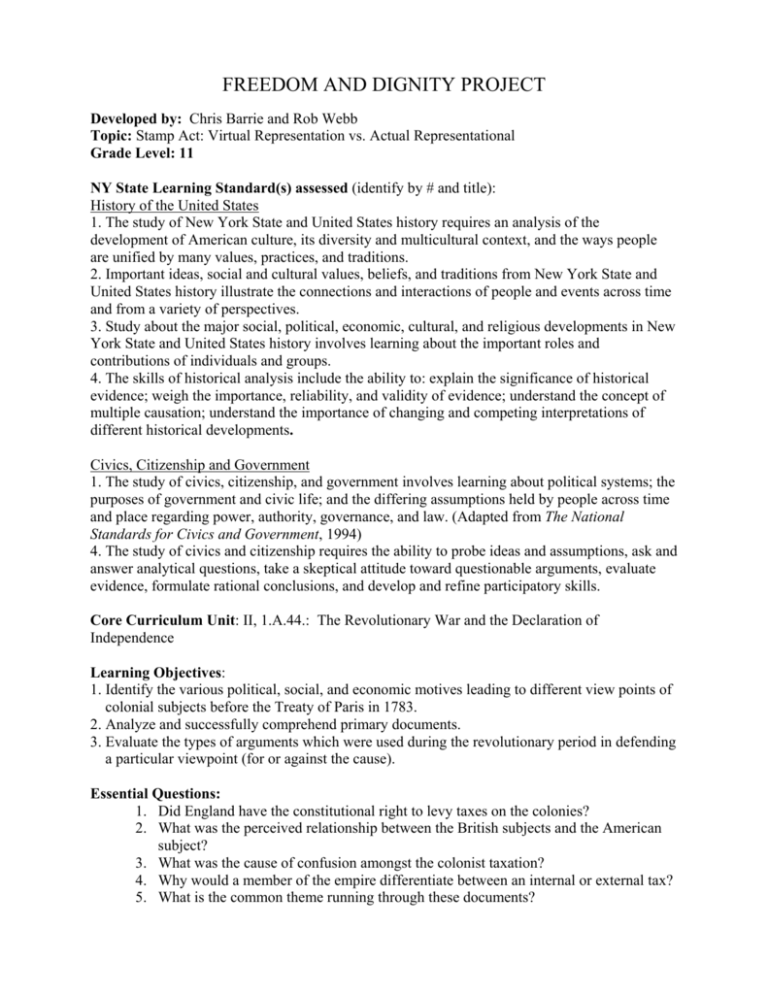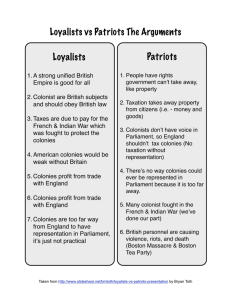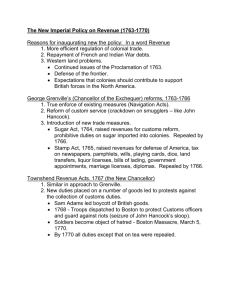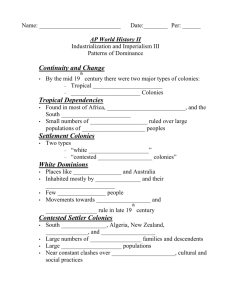
FREEDOM AND DIGNITY PROJECT
Developed by: Chris Barrie and Rob Webb
Topic: Stamp Act: Virtual Representation vs. Actual Representational
Grade Level: 11
NY State Learning Standard(s) assessed (identify by # and title):
History of the United States
1. The study of New York State and United States history requires an analysis of the
development of American culture, its diversity and multicultural context, and the ways people
are unified by many values, practices, and traditions.
2. Important ideas, social and cultural values, beliefs, and traditions from New York State and
United States history illustrate the connections and interactions of people and events across time
and from a variety of perspectives.
3. Study about the major social, political, economic, cultural, and religious developments in New
York State and United States history involves learning about the important roles and
contributions of individuals and groups.
4. The skills of historical analysis include the ability to: explain the significance of historical
evidence; weigh the importance, reliability, and validity of evidence; understand the concept of
multiple causation; understand the importance of changing and competing interpretations of
different historical developments.
Civics, Citizenship and Government
1. The study of civics, citizenship, and government involves learning about political systems; the
purposes of government and civic life; and the differing assumptions held by people across time
and place regarding power, authority, governance, and law. (Adapted from The National
Standards for Civics and Government, 1994)
4. The study of civics and citizenship requires the ability to probe ideas and assumptions, ask and
answer analytical questions, take a skeptical attitude toward questionable arguments, evaluate
evidence, formulate rational conclusions, and develop and refine participatory skills.
Core Curriculum Unit: II, 1.A.44.: The Revolutionary War and the Declaration of
Independence
Learning Objectives:
1. Identify the various political, social, and economic motives leading to different view points of
colonial subjects before the Treaty of Paris in 1783.
2. Analyze and successfully comprehend primary documents.
3. Evaluate the types of arguments which were used during the revolutionary period in defending
a particular viewpoint (for or against the cause).
Essential Questions:
1. Did England have the constitutional right to levy taxes on the colonies?
2. What was the perceived relationship between the British subjects and the American
subject?
3. What was the cause of confusion amongst the colonist taxation?
4. Why would a member of the empire differentiate between an internal or external tax?
5. What is the common theme running through these documents?
6. Do you feel that a compromise could be reached prior to the first shot?
Overview of the Learning Experience Module (in narrative form):
This module is designed to initiate students into using primary source materials in order
to learn how to defend or refute historical documents. These documents deal with the issue of
external and internal taxation; the rights of Americans; the rights of Englishmen and what it
means to be a member of the British Empire.
Time Allotment (classroom time): 2 class period (84 minutes)
Vocabulary (key terms):
consent
external taxation
internal taxation
propaganda
revolution
Whig/Patriot
virtual representation
statute
electors
levy
inquisitory
revenue
Tory/Loyalist
duty
propriety
imposition
Materials/Resources:
• What materials/resources are needed by students?
o Primary Source: Letter from Beekman to Pierre (10/10/1777)
o Primary Source: John Dickenson Letter from a farmer II
http://www.ashbrook.org/library/18/dickenson/letter2.html
(attached below)
o Primary Source: Daniel Dulany
http://odur.let.rug.nl/~usa/D/1751-1775/stampact/consid.htm
(attached below)
• What materials/resources are needed by teachers?
o Overhead/power point projector
Procedure:
• As the warm up activity, have the primary source (letter from Beekman to Pierre) in front
of the students or on the overhead projector. Analyze the letter and demonstrate what the
students should be looking for in the other primary sources that will be used today.
• Go over homework that relates to the Stamp Act Congress.
• Divide the class into 4 groups. Two groups will have the article that supports the
Representative Taxation while the other two groups will have a primary source that will
support Virtual Taxation. Each group will answer a series of questions that relate to the
article.
• Once that is completed, the worksheets will be answered out loud and then the groups
will debate whether Virtual or Representative Taxation is better based on those two
primary sources.
• Students will be assessed by creating a letter during that time period. The letter has to
express your viewpoint based upon the facts that you got through out the documents and
your general knowledge of the American Revolution. Do you believe in virtual or
representative taxation? Why? Have the date on top on your letter, opening, closing, and
•
proper paragraphs. Also include what colony you live in, rural or urban, and your
occupation and how that relates to your view point.
Homework will be assigned.
Assessment:
• Students will be assessed by creating a letter written in March 1775. The letter has to
express a viewpoint based upon the facts contained in the documents and their knowledge of
the American Revolution. The student will produce a letter in which the concept of taxation
from the point of view of the gentry or elector will be expressed. The letter will have the
proper date, an 18th Century opening, a body that addresses the information needed, and 18th
Century closing.
Rubric for Virtual Taxation Lesson:
Worth
I. Opening
5
II. Closing
5
III. Date
5
IV. Body
80
a. Proper view point (20)
b. 3 facts that support view point
1. Information from readings (15)
2. Information from previous lessons (15)
3. Information from general knowledge (15)
V. Grammar
Total
100
Received
_____
_____
_____
_____
5
_____
_____
Letter 2 from Letters from a Pennsylvania Farmer
John Dickenson
1767-1768
There is another late act of parliament, which appears to me to be unconstitutional, and as
destructive to the liberty of these colonies, as that mentioned in my last letter; that is, the act for
granting the duties on paper, glass, &c. [the Townshend Act].
The parliament unquestionably possesses a legal authority to regulate the trade of Great-Britain
and all her colonies. Such an authority is essential to the relation between a mother country and
her colonies; and necessary for the common good of all. He, who considers these provinces as
states distinct from the British empire, has very slender notions of justice, or of their interests.
We are but parts of a whole; and therefore there must exist a power somewhere to preside, and
preserve the connection in due order. This power is lodged in the parliament; and we are as much
dependent on Great-Britain, as a perfectly free people can be on another.
I have looked over every statute relating to these colonies, from their first settlement to this time;
and find every one of them founded on this principle, till the Stamp Act administration. All
before, are calculated to regulate trade, and preserve or promote a mutually beneficial intercourse
between the several constituent parts of the empire; and though many of them imposed duties on
trade, yet those duties were always imposed with design to restrain the commerce of one part,
that was injurious to another, and thus to promote the general welfare. The raising a revenue
thereby was never intended . . $#151; Never did the British parliament, till the period above
mentioned think of imposing duties in America, F0R THE PURPOSE OF RAISING A
REVENUE. .
Here we may observe an authority expressly claimed and exerted to impose duties on these
colonies; not for the regulation of trade; not for the preservation or promotion of a mutually
beneficial intercourse between the several constituent parts of the empire, heretofore the sole
objects of parliamentary institutions; but for the single purpose of levying money upon us.
This I call an innovation; and a most dangerous innovation. It may perhaps be objected, that
Great-Britain has a right to lay what duties she pleases upon her exports, and it makes no
difference to us, whether they are paid here or there.
To this I answer. These colonies require many things for their use, which the laws of GreatBritain prohibit them from getting any where but from her. Such are paper and glass.
That we may be legally bound to pay any general duties on these commodities relative to the
regulation of trade, is granted; but we being obliged by the laws to take from Great-Britain, any
special duties imposed on their exportation to us only, with intention to raise a revenue from us
only, are as much taxes, upon us, as those imposed by the Stamp Act.
What is the difference in substance and right whether the same sum is raised upon us by the rates
mentioned in the Stamp Act, on the use of paper, or by these duties, on the importation of it. It is
only the edition of a former book, shifting a sentence from the end to the beginning....
Some persons perhaps may say, that this act lays us under no necessity to pay the duties
imposed, because we may ourselves manufacture the articles on which they are laid; whereas by
the Stamp Act no instrument of writing could be good, unless made on British paper, and that too
stamped.
I am told there are but two or three glass-houses on this continent, and but very few paper-mills;
and suppose more should be erected, a long course of years must elapse, before they can be
brought to perfection. This continent is a country of planters, farmers, and fishermen; not of
manufacturers. The difficulty of establishing particular manufactures in such a country, is almost
insuperable. .
Great-Britain has prohibited the manufacturing iron and steel in these colonies, without any
objection being made to her right of doing it. The like right she must have to prohibit any other
manufacture among us. Thus she is possessed of an undisputed precedent on that point. This
authority, she will say, is founded on the original intention of settling these colonies; that is, that
we should manufacture for them, and that they should supply her with materials.
Here then, my dear country men ROUSE yourselves, and behold the ruin hanging over your
heads. If you ONCE admit, that Great-Britain may lay duties upon her exportations to us, for the
purpose of levying money on us only, she then will have nothing to do, but to lay those duties on
the articles which she prohibits us to manufacture—and the tragedy of American liberty is
finished. . . . If Great-Britain can order us to come to her for necessaries we want, and can order
us to pay what taxes she pleases before we take them away, or when we land them here, we are
as abject slaves as France and Poland can shew in wooden shoes, and with uncombed hair.
[From: http://www.ashbrook.org/library/18/dickenson/letter2.html, accessed7/19/04]
Daniel Dulany
Considerations on the Propriety of Imposing Taxes in the British Colonies, for the Purpose of
rasing a Revenue, by Act of Parliament
*** Quote ***
I shall undertake to disprove the supposed similarity of situation, whence the same kind of
Representation is deduced of the inhabitants of the colonies, and of the British non-electors; and,
if I succeed, the Notion of a virtual representation of the colonies must fail, which, in Truth is a
mere cob-web, spread to catch the unwary, and intangle the weak. I would be understood. I am
upon a question of propriety, not of power; and though some may be inclined to think it is to
little purpose to discuss the one, when the other is irresistible, yet are they different
considerations; and, at the same time that I invalidate the claim upon which it is founded, I may
very consistently recommend a submission to the law, whilst it endures. .
Lessees for years, copyholders, proprietors of. the public funds, inhabitants of Birmingham,
Leeds, Halifax and Manchester, merchants of the City of London, or members of the corporation
of the East India Company, are, as such, under no personal incapacity to be electors; for they
may acquire the right of election, and there are actually not only a considerable number of
electors in each of the classes of lessees for years etc., but in many of them, if not all, even
members of Parliament. The interests therefore of the nonelectors, the electors, and the
representatives, are individually the same; to say nothing of the connection among neighbours,
friends and relations. The security of the non-electors against oppression, is that their oppression
will fall also upon the electors and the representatives. The one can't be injured and the other
indemnified.
Further, if the nonelectors should not be taxed by the British Parliament, they would not be taxed
at all; and it would be iniquitous, as well as a solecism in the political system, that they should
partake of all the benefits resulting from the imposition and application of taxes, and derive an
immunity from the circumstances of not being qualified to vote. Under this Constitution then, a
double or virtual representation may be reasonably supposed.
There is not that intimate and inseparable relation between the electors of Great-Britain and the
inhabitants of the colonies, which must inevitably involve both in the same taxation; on the
contrary, not a single actual elector in England, might be immediately affected by a taxation in
America, imposed by a statute which would have a general operation and effect, upon the
properties of the inhabitants of the colonies . . . wherefore the relation between the British
Americans, and the English electors, is a knot too infirm to be relied on. . .
It appears to me, that there is a clear and necessary Distinction between an Act imposing a tax
for the single purpose of revenue, and those Acts which have been made for the regulation of
trade, and have produced some revenue in consequence of their effect and operation as
regulations of trade.
The colonies claim the privileges of British subjects -It has been proved to be inconsistent with
those privileges, to tax them without their own consent, and it hath been demonstrated that a tax
imposed by Parliament, is a tax without their consent.
The subordination of the colonies, aid the authority of Parliament to preserve it, have been fully
acknowledged. Not only the welfare, but perhaps the existence of the mother country, as an
independent kingdom, may depend upon her trade and navigation, and these so far upon her
intercourse with the colonies, that if this should be neglected, there would soon be an end to that
commerce, whence her greatest wealth is derived, and upon whichhich her maritime power is
principally founded. From these considerations, the right of the British Parliament to regulate the
trade of the colonies, may be justly deduced; a denial of it would contradict the admission of the
subordination, and of the authority to preserve it, resulting from the nature of the relation
between the mother country and her colonies. It is a common, and frequently the most proper
method to regulate trade by duties on imports and exports. The authority of the mother country to
regulate the trade of the colonies being unquestionable, what regulations are the most proper, are
to be of course submitted to the determination of the Parliament; and if an incidental revenue,
should be produced by such regulations; these are not therefore unwarrantable.
A right to impose an internal tax on the colonies, without their consent for the single purpose of
revenue, is denied, a right to regulate their trade without their consent is admitted. The
imposition of a duty may, in some instances, be the proper regulation. If the claims of the mother
country and the colonies should seem on such an occasion to interfere, and the point of right to
be doubtful, (which I take to be otherwise) it is easy to guess that the determination will be on
the side of power, and the inferior will be constrained to submit.
Text prepared by Garry Wiersema
for From Revolution to Reconstruction - an .HTML project.
Last update: 2004-7-19 time: 11:51
© 1994- 2003. All rights reserved. Department of Humanities Computing
[from: http://odur.let.rug.nl/~usa/D/1751-1775/stampact/consid.htm; accessed 7/19/04]







